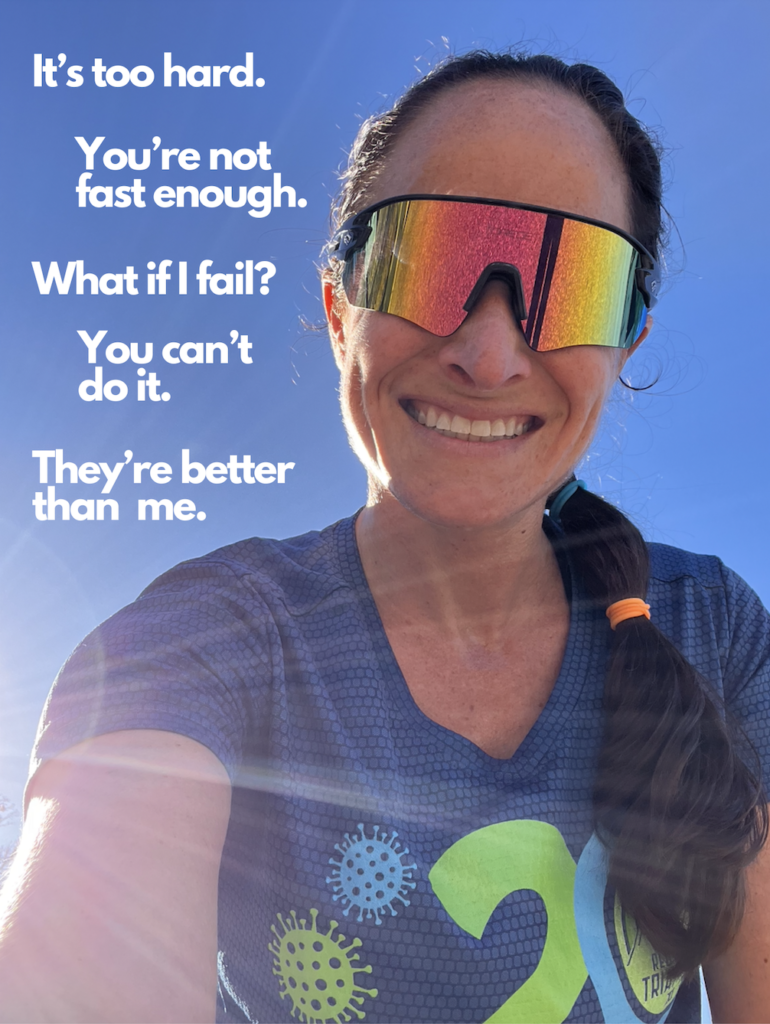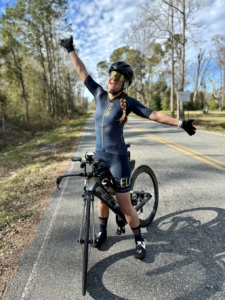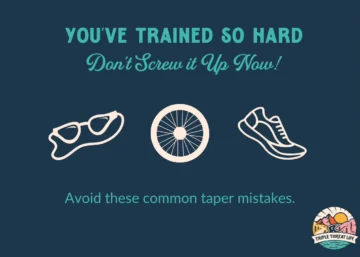
The words we say to ourselves matter, more than you might think. New research has shown that positive self-talk isn’t just a method to increase confidence or motivation; it can have huge performance boosting benefits. The key is that it’s not just what we say, but how we say it.
The Genius of Athletes
An amazing book by Dr. Noel Brick, The Genius of Athletes, shows why it’s important to develop a strong mental game. He explains how everyday athletes can use the same strategies as elite athletes to improve performance. He provides examples of how legendary marathoner, Meb Keflezighi, uses self-talk during races and how Michael Phelps used “if-then planning” during swim practice to win a gold medal at the Olympics.
Using positive self-talk is probably something you do already. Imagine that you’re pushing hard during the last mile of a run. You might think to yourself, “I’m almost there!” What about when you’re trying to calm your nerves on the start line of a race? You might think something like, “take a deep breath and relax.” Those are examples of self-talk.
I versus you
There are different types of self-talk. Motivational self-talk includes positive phrases that are meant to boost mood or improve self-confidence like, “I can do this!” Then there’s instructional self-talk, which includes verbal cues like “quick feet,” “relax the shoulders,” or “engage the glutes.”
But recent research has gone even deeper and started looking at not just what we say, but how we say it. Studies have shown that referring to yourself during self-talk as “you” instead of “I” is far more beneficial.
For example, consider the difference in meaning between the two sentences: “I can do this!” vs. “You can do this!”
The idea behind using the second person pronoun, “you,” creates a sense of psychological distance between yourself and the challenging situation. It sounds more like something a coach or friend might say, which provides an external perspective. It might seem like something small, but this subconscious shift can help a great deal when doubts start to creep in during a hard workout or toward the end of a race. Essentially, it’s about changing your emotional response to an experience.
Skeptical? Look at the science. One study had 24 cyclists ride at 80% of peak power during a time trial to establish a baseline. Then, over the next two weeks, 50% of the cyclists were trained in positive self-talk. Then, they did the time trial again. The self-talk group lasted an average of 18% longer; that’s almost 2 minutes more than the first trial! That’s an incredible increase, and it was achieved by something as simple as using the right words.
 The words we use are important
The words we use are important
This week, I had a run off the bike, or a brick workout, for those familiar with triathlon-speak. My coach’s instructions for the short, 2-mile run were simple- “happy and joyful running.” Now, when my coach says something like that, there’s certainly an underlying message as well. #1- “You need to keep the run aerobic” and #2- “Save your energy because there’s something hard coming later this week!”
But, in this case, the specific words- “happy and joyful”- got me thinking. What does it mean to run joyful? When was the last time you ran, or rode your bike, or swam, or worked out, and were joyful? All too often, we’re so concerned about time, pace, speed, power, cadence, miles, heart rate and all the other countless metrics that it’s easy to lose some of the joy in what we’re doing.
Those specific words had an impact on my easy run that day. I thought about how the cold air felt on my skin. I enjoyed the warmth of the sunshine. I listened to the birds chirping and the crunch of leaves under my feet. More than anything else, I tried to be present in the moment (something that’s very hard for me to do, but I’m learning.)
Failure or setback?
Last week, a friend of mine was upset that she didn’t finish her 3-hour bike ride, because she was having trouble due to it being that time of the month. She only completed 2 hours and called it a “failure.” But is that really accurate? She did 66% of the workout during less-than-ideal circumstances. She could’ve sat on the couch and did 0%, but she didn’t. Will that one workout have a damaging effect on her physical preparation for her upcoming race? No. But will that mental defeat sap her motivation, lower self-confidence, and make her feel worse about herself? It’s very likely.
All this to say that words are incredible powerful. Think about the words you use to describe your workout, your effort, your performance, and the way you feel about yourself as an athlete and person. Avoid phrases like:
- I’m bad at swimming.
- I’m not a good runner.
- I’m a slow cyclist.
- I’m too fat, thin, curvy, uncoordinated, not athletic, ect.
Instead:
- Swimming is a challenge for me, but I’m improving.
- I’m better at running than when I first started.
- I have excellent endurance.
- My body is strong and allows me to do the things I love.
If you like Dr. Noel Brick’s book- The Genius of Athletes– you’ve got to read Alex Hutchinson’s Endure: Mind, Body, and the Curiously Elastic Limits of Human Performance. It will change the way you think about yourself and your perceived physical limits. Perhaps you’re capable of far more than you think.
If you enjoyed this post, check out Process Goals vs. Outcome Goals: Which is Best? and How to Avoid the Trap of “What If” Thinking.
If you’re new here, I post on the blog on Tuesdays and Thursdays. Be sure to follow @bblife234 and @thetriplethreatlife on Instagram to find out when they’re live.


